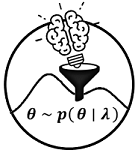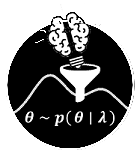Source code for elicit.targets
# noqa SPDX-FileCopyrightText: 2024 Florence Bockting <florence.bockting@tu-dortmund.de>
#
# noqa SPDX-License-Identifier: Apache-2.0
import tensorflow as tf
import tensorflow_probability as tfp
import bayesflow as bf
import inspect
import pandas as pd
from elicit.extras import utils
tfd = tfp.distributions
bfn = bf.networks
# TODO: Update Custom Target Function
[docs]
def use_custom_functions(custom_function, model_simulations):
"""
Helper function that prepares custom functions if specified by checking
all inputs and extracting the argument from different sources.
Parameters
----------
custom_function : callable
custom function as specified by the user.
model_simulations : dict
simulations from the generative model.
global_dict : dict
dictionary including all user-input settings.
Returns
-------
custom_quantity : tf.Tensor
returns the evaluated custom function.
"""
# get function
custom_func = custom_function["function"]
# create a dict with arguments from model simulations and custom args
# for custom func
args_dict = dict()
if custom_function["additional_args"] is not None:
additional_args_dict = {
f"{key}": custom_function["additional_args"][key]
for key in list(custom_function["additional_args"].keys())
}
else:
additional_args_dict = {}
# select only relevant keys from args_dict
custom_args_keys = inspect.getfullargspec(custom_func)[0]
# check whether expert-specific input has been specified
if "from_simulated_truth" in custom_args_keys:
for i in range(len(inspect.getfullargspec(custom_func)[3][0])):
quantity = inspect.getfullargspec(custom_func)[3][i][0]
true_model_simulations = pd.read_pickle(
output_path + "/expert/model_simulations.pkl"
)
for key in custom_args_keys:
if f"{key}" == quantity:
args_dict[key] = true_model_simulations[quantity]
custom_args_keys.remove(quantity)
custom_args_keys.remove("from_simulated_truth")
# TODO: check that all args needed for custom function were detected
for key in list(set(custom_args_keys) - set(additional_args_dict)):
args_dict[key] = model_simulations[key]
for key in additional_args_dict:
args_dict.update(additional_args_dict)
# evaluate custom function
custom_quantity = custom_func(**args_dict)
return custom_quantity
[docs]
def computation_elicited_statistics(
target_quantities: dict, targets):
"""
Computes the elicited statistics from the target quantities by applying a
prespecified elicitation technique.
Parameters
----------
target_quantities : dict
simulated target quantities.
global_dict : dict
dictionary including all user-input settings.
Returns
-------
elicits_res : dict
simulated elicited statistics.
"""
# initialize dict for storing results
elicits_res = dict()
# loop over elicitation techniques
for i in range(len(targets)):
# use custom method if specified otherwise use built-in methods
if targets[i]["query"]["name"] == "custom":
elicited_statistic = use_custom_functions(
targets[i]["elicitation_method"]["value"],
target_quantities
)
elicits_res[f"custom_{targets[i]['name']}"] = elicited_statistic
if targets[i]["query"]["name"] == "identity":
elicits_res[f"identity_{targets[i]['name']}"
] = target_quantities[targets[i]['name']]
if targets[i]["query"]["name"] == "pearson_correlation":
# compute correlation between model parameters (used for
# learning correlation structure of joint prior)
elicited_statistic = utils.pearson_correlation(
target_quantities[targets[i]['name']])
# save correlation in result dictionary
elicits_res[f"pearson_{targets[i]['name']}"
] = elicited_statistic
if targets[i]["query"]["name"] == "quantiles":
quantiles = targets[i]["query"]["value"]
# reshape target quantity
if tf.rank(target_quantities[targets[i]['name']]) == 3:
quan_reshaped = tf.reshape(
target_quantities[targets[i]['name']],
shape=(
target_quantities[targets[i]['name']].shape[0],
target_quantities[targets[i]['name']].shape[1]
* target_quantities[targets[i]['name']].shape[2],
),
)
if tf.rank(target_quantities[targets[i]['name']]) == 2:
quan_reshaped = target_quantities[targets[i]['name']]
# compute quantiles
computed_quantiles = tfp.stats.percentile(
quan_reshaped, q=quantiles, axis=-1
)
# bring quantiles to the last dimension
elicited_statistic = tf.einsum("ij...->ji...",
computed_quantiles)
elicits_res[f"quantiles_{targets[i]['name']}"] = elicited_statistic
# return results
return elicits_res
[docs]
def computation_target_quantities(model_simulations, targets):
"""
Computes target quantities from model simulations.
Parameters
----------
model_simulations : dict
simulations from generative model.
global_dict : dict
dictionary including all user-input settings..
Returns
-------
targets_res : dict
computed target quantities.
"""
# initialize dict for storing results
targets_res = dict()
# loop over target quantities
for i in range(len(targets)):
tar = targets[i]
# use custom function for target quantity if it has been defined
if tar["name"] == "correlation":
target_quantity = model_simulations["prior_samples"]
elif (
tar["target_method"] is not None
):
target_quantity = use_custom_functions(
tar["target_method"],
model_simulations
)
else:
target_quantity = model_simulations[tar["name"]]
# save target quantities
targets_res[tar["name"]] = target_quantity
return targets_res

